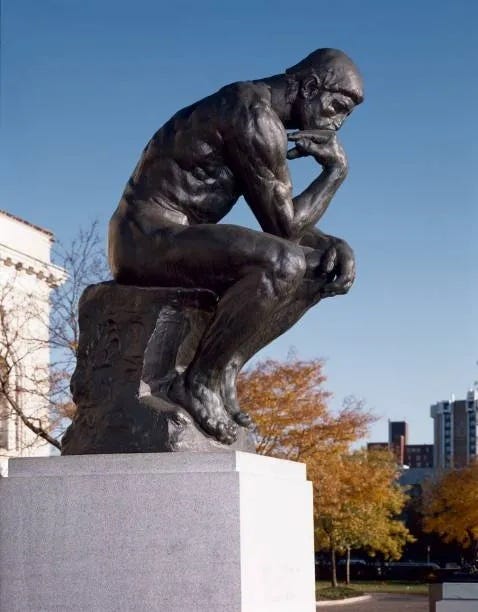Critical Thinker? Don't You Dare...
The sorry state of public education, I mean indoctrination.
We have been indoctrinated throughout our long experience with K-12 public “education.” And it doesn’t stop there. If you enter a college or university, the indoctrination continues. The higher your education level, the more indoctrinated you become. The more letters you earn to put after your name; PHD, MD, MA, BA, BSB etc. the deeper you are ingrained in the indoctrination matrix. The more you spend on your education, the more likely you will convince yourself that your education has value. Therefore the less likely you are to question it.
The self-proclaimed "authorities" of the heliocentric model have to make stuff up to make their model work. Most people are ignorant of the facts and don't bother to investigate the heliocentric model for themselves. Even so, the so-called globers defend the model they have been indoctrinated with since birth; most don’t even know the relevant details of the model they defend. Globe belief is part of our herd-psychology. The unproven heliocentric model is the only model taught, in spite of the fact that there is a competing geocentric model that exists, and better matches our personal observations. It takes a bit of courage to think outside the box when everyone around you is stuck in their herd-mentality belief system.
Our "education" system is pitiful. It is based on the Prussian authoritarian model as described by John Taylor Gatto in his books. Students are required to repeat what they are told (rote learning) without asking difficult questions. Critical thinking is not rewarded, and in some cases punished via testing methods and scoring. The best grades are handed out to students who comply with the program. Not those who critically think outside-the-box.
I had a direct experience with this at the University. I proved that a heavily weighted test question was worded in such a way that it required thinking beyond what the associated lecture presented. A twist in logic that I picked up on from the test question's wording was different from what we learned in the lecture. I apparently was the only student in the class that picked up on this. The rest just repeated from the lecture without thinking about or considering the test question's wording. They essentially jumped to their conclusion without thinking. On recollection, I learned a lesson that day. Don’t assume others can think. To borrow from Zig Ziglar, some people have “stinking thinking.”
When my answer to the question was marked incorrect, I pushed back and challenged the professor about it. Rather than admitting I had a point, he sent me to the TA who had written the test question. Confident in my answer, I challenged the TA. The TA said what he was looking for was what was covered in the lecture. I said that the way the test question was worded could only be answered correctly by my answer. He said that if he changed the answer for me he would have to change the answer for all the students that answered incorrectly, and gave the answer he was looking for. So to protect himself from embarrassment he would not correct his error. In his case he exchanged his integrity for personal ease. I wonder how often this type of exchange is made on a daily basis?
I relate this story because it gives an example of how our education system is set up, and the kind of student the higher learning institutions want to graduate. It is a small wonder that so many in society "believe" in the heliocentric-religion as presented by colleges and universities. People realize they will be punished for thinking outside the box, so rather than bother to think, they fall back on and defend their indoctrination. They treat critical thinking as if it is taboo.
John Taylor Gatto quit his job in public education because as he said, “I had to stop hurting the children.” He had the integrity to exit his position and stand on his principals. He went on to write books on how our education system got to this state. His first book Dumbing Us Down is aptly titled. John relates his personal observation of how “schools” are set up with short periods; students move from classroom to classroom to learn different subjects. In many cases a bell or buzzer (Pavlov conditioning?) indicates that it is time to switch classrooms for the next teacher’s lesson. John remarked in his book that students learn at different rates. He found that he was just getting through to some students when it was time for them to pick up their books and move on to the next class. He regards those moments opportunities lost.
John also researched the way education was performed before the Prussian model of “schooling” was adopted. Schools had students of various ages grouped together in the same classrooms. He claimed that the basic skills of reading, writing and arithmetic could be learned in a matter of weeks. He also understood that students learn at different rates, based on their motivation for learning a given topic. Forcing students in grade levels by age is only marginally effective. If students lack motivation or are not properly motivated, they are not likely to do well in a given topic.
19th century literacy rates in the United States were relatively high, despite the country's decentralized educational system. By 1875, the U.S. literacy rate was approximately 80 percent. Today the literacy rate is estimated to be 79 percent. Centralized learning with it’s associated costs have not improved literacy in over a 100 years. Small wonder we have had calls to eliminate the Board of Education. It probably does more to hold students back than it does to motivate them to learn.
Another topic I have written about before is the Holocaust. There is an effort being made to make discussing both sides of the Holocaust taboo. Dissenters to the myth may be punished under the pending Antisemitism Awareness Act. Our public education system in the US and elsewhere, requires that students be taught the “official” narrative of the Holocaust.
Holocaust Education Requirements
Germar Rudolph has done a deep dive into the topic of the Holocaust. He published the Holocaust Encyclopedia and maintains a website Holocaust Handbooks, where books in PDF format and videos can be viewed. It is a wealth of information available for those who wish to look into this topic.
Forensic science, also known as criminalistics, is the application of science principles and methods to support legal decision-making in matters of criminal and civil law. In the case for the Holocaust, there is no forensic evidence that exists for what we have been told, which is that an industrial scale of systematic murder of “death camp” inmates occurred in Poland and other camps. A critical thinker would have to ask the question. If such a massive crime took place, how is it that no forensic evidence can be found? A crime on such a massive scale would require an immense amount of cover up activity to hide the existence of the crime. Those fleeing the camps as the Russians approached did not have the time necessary to cover their tracks. So is the fact that no forensic evidence exists a reason to question the official narrative on this topic? I consider myself a critical thinker, so show me the evidence!
I visited Holocaust central, Auschwitz-Birkenau in April, 2012. I wouldn’t have chosen this to be a place for stop on a European vacation, but my wife wanted to go so I booked a flight to Krakow. We toured the site and saw what was left of it that the tourists were led around to view. At the time I didn’t know of the swimming pool on the site, so I didn’t know I could search for it. In any case, the site didn’t impress me that it was a camp used for institutionalized murder.
The photo below I took is of us tourists going in to the crematorium. The crematorium did not impress me as a facility that could keep up with the task of cremating the number of bodies it supposedly had to deal with. Of course I later saw evidence that proves that my intuition at that moment was correct.
I have also been to the Holocaust museums in Poland, St Petersburg, Florida, and in Washington D.C. The museums are an elaborate charade, a travesty of lies intended to convince us that the “official” narrative is true. I can say it most certainly is not true.
To conclude this article, there is much we take for granted that is based on our public indoctrination. It is like there is a war on consciousness. Alex Newman co authored a book on the topic titled Crimes of the Educators. Alex discusses the book in this clip.






